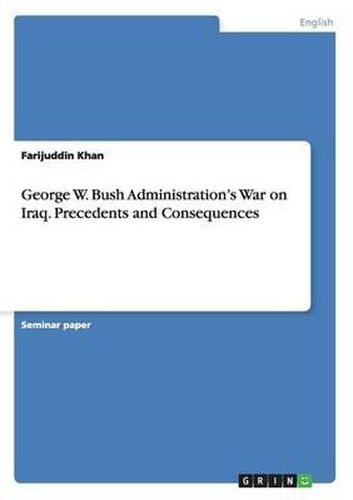Readings Newsletter
Become a Readings Member to make your shopping experience even easier.
Sign in or sign up for free!
You’re not far away from qualifying for FREE standard shipping within Australia
You’ve qualified for FREE standard shipping within Australia
The cart is loading…






Seminar paper from the year 2013 in the subject American Studies - Culture and Applied Geography, grade: 8, Jawaharlal Nehru University (School of International Studies, Jawaharlal Nehru University), course: US Foreign Policy after the Second World War, language: English, abstract: Following the 2001 invasion in Afghanistan to dismantle Taliban regime, the United States engaged in a more difficult war in Iraq by invading it in March 2003 following what was appeared a success in Afghanistan. Before the invasion, the George W. Bush administration launched its National Security Strategy of 2002 as a quick and powerful response to the deadly 9/11 attacks in the United States. The strategy was indoctrinated with such provisions to re-define terrorism and respond to it with high level of precision and effectiveness. The pre-emptive Doctrine of 2002, commonly known as Bush Doctrine, gave way to offensive and radical foreign policy of ‘regime change’ on the basis of ‘perceived threat-perception’ from Saddam Hussein’s regime in Iraq under the Bush administration. Provisions like pre-emptive strike, unilateralism in international relations, military hegemony, etc. negates the settled international sovereignty, significantly challenged the territorial integrity norms and clearly undermines the international body, the United Nations, by one of its leading founding-member. The paper seeks an attempt to explain and analyze Bush’s costly Iraq War. It also attempts to study impact it creates on both domestic and international stage thoroughly.
$9.00 standard shipping within Australia
FREE standard shipping within Australia for orders over $100.00
Express & International shipping calculated at checkout
Seminar paper from the year 2013 in the subject American Studies - Culture and Applied Geography, grade: 8, Jawaharlal Nehru University (School of International Studies, Jawaharlal Nehru University), course: US Foreign Policy after the Second World War, language: English, abstract: Following the 2001 invasion in Afghanistan to dismantle Taliban regime, the United States engaged in a more difficult war in Iraq by invading it in March 2003 following what was appeared a success in Afghanistan. Before the invasion, the George W. Bush administration launched its National Security Strategy of 2002 as a quick and powerful response to the deadly 9/11 attacks in the United States. The strategy was indoctrinated with such provisions to re-define terrorism and respond to it with high level of precision and effectiveness. The pre-emptive Doctrine of 2002, commonly known as Bush Doctrine, gave way to offensive and radical foreign policy of ‘regime change’ on the basis of ‘perceived threat-perception’ from Saddam Hussein’s regime in Iraq under the Bush administration. Provisions like pre-emptive strike, unilateralism in international relations, military hegemony, etc. negates the settled international sovereignty, significantly challenged the territorial integrity norms and clearly undermines the international body, the United Nations, by one of its leading founding-member. The paper seeks an attempt to explain and analyze Bush’s costly Iraq War. It also attempts to study impact it creates on both domestic and international stage thoroughly.